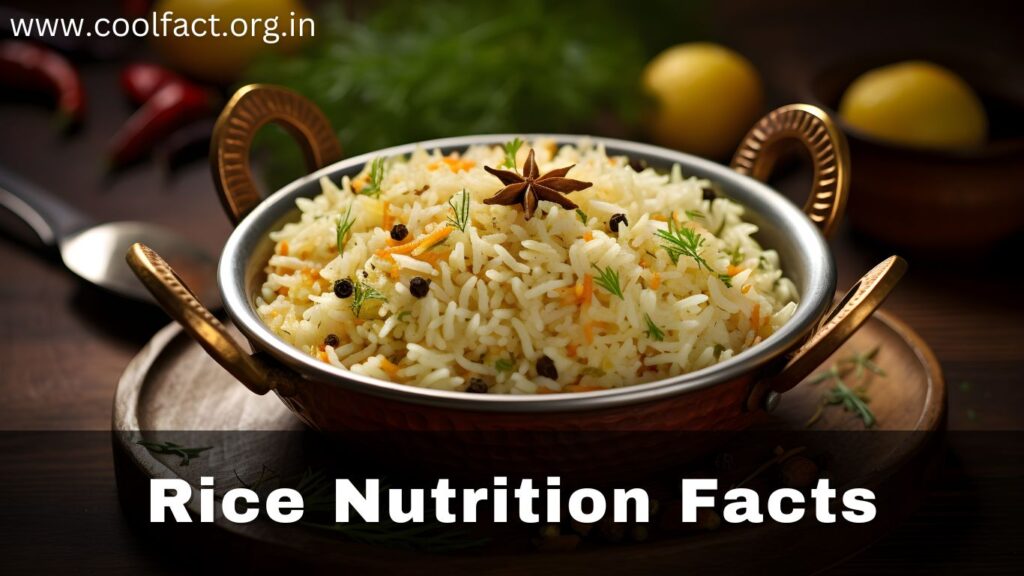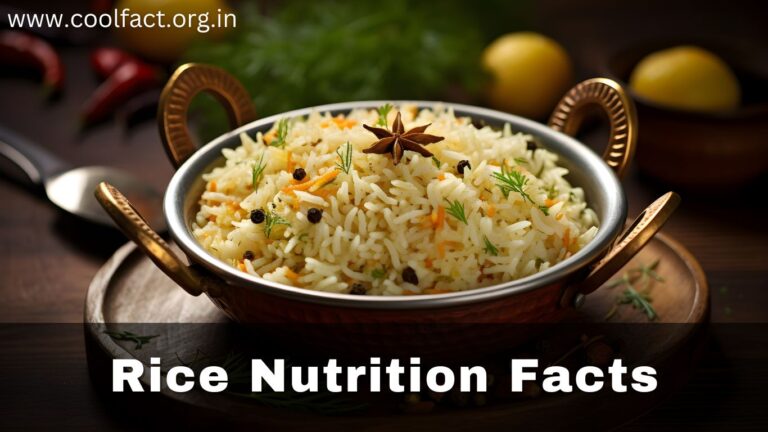Rice Nutrition Facts: Rice is one of the most widely consumed foods in the world, especially in Asia. It has been a staple in many cultures for centuries, offering a versatile and nourishing addition to meals. Whether it’s fluffy white rice, aromatic basmati, or nutrient-rich brown rice, this grain is packed with energy and essential nutrients. Let’s dive into the nutritional facts of rice, explore its health benefits, and learn why it is a vital part of a balanced diet.

Nutritional Value of Rice (Per 100g – Cooked White Rice)
| Nutrient | Amount |
|---|---|
| Calories | 130 kcal |
| Carbohydrates | 28 g |
| Protein | 2.7 g |
| Fat | 0.3 g |
| Dietary Fiber | 0.4 g |
| Iron | 1% of Daily Value |
| Potassium | 35 mg |
| Vitamin B6 | 5% of Daily Value |
| Magnesium | 3% of Daily Value |
3 Science-Backed Reasons to Highlight the Importance of Protein
- Protein Builds and Repairs Tissues
Protein is essential for the growth and repair of body tissues. Pairing rice with protein-rich foods like lentils or chicken makes a complete meal that helps maintain healthy muscles and tissues. - Supports Enzyme and Hormone Production
Proteins play a crucial role in producing enzymes and hormones, which regulate important bodily functions like digestion and metabolism. Rice complements a protein-rich diet, making it a balanced source of energy. - Provides Sustained Energy
Combining rice with protein-packed foods provides sustained energy throughout the day, making it a perfect choice for athletes or students who need to stay active and focused.
10 Health Benefits of Rice (Rice Nutrition Facts)
1. Rich Source of Energy
Rice is one of the best sources of carbohydrates, the body’s primary fuel for energy. When consumed, rice breaks down into glucose, which is used to power muscles and brain function. This makes it ideal for athletes, students, or anyone with a physically demanding lifestyle. Its quick energy-boosting properties make it a go-to meal for those needing sustained performance throughout the day.
2. Supports Digestive Health
Brown rice, in particular, is rich in dietary fiber, which plays a key role in promoting digestive health. Fiber adds bulk to the stool, helping prevent constipation and improving regularity. Additionally, the prebiotic properties of rice support the growth of beneficial gut bacteria, enhancing overall gut health. This makes rice a gentle yet effective food for individuals with sensitive digestive systems.
3. Gluten-Free Grain
For individuals with celiac disease or gluten intolerance, rice serves as a safe and nutritious option. Unlike wheat-based grains, rice does not contain gluten, eliminating the risk of triggering allergic or digestive reactions. Its versatility also allows it to be used in various gluten-free recipes, from pasta to bread, ensuring that individuals with dietary restrictions can enjoy diverse meals.
4. Boosts Heart Health
Brown rice is particularly heart-friendly, thanks to its high magnesium and antioxidant content. Magnesium is essential for maintaining a steady heartbeat and preventing arterial calcification, while antioxidants help reduce oxidative stress, a major contributor to heart disease. By lowering bad cholesterol (LDL) and regulating blood pressure, rice promotes cardiovascular health and reduces the risk of heart attacks and strokes.
5. Helps Maintain Weight
When consumed in appropriate portions, rice can be a helpful ally in weight management. White rice, being low in fat and easy to digest, provides a light meal option. On the other hand, brown rice, with its high fiber content, keeps you fuller for longer, curbing unnecessary snacking and overeating. The slow-digesting carbohydrates in brown rice also prevent sudden spikes in blood sugar, making it a better choice for those aiming to shed or maintain weight.
6. Improves Bone Strength
Rice, particularly brown rice, is a natural source of magnesium and phosphorus, both essential minerals for maintaining bone density. Magnesium plays a critical role in calcium absorption, ensuring bones remain strong and healthy. Regular consumption of rice as part of a balanced diet helps reduce the risk of osteoporosis and other bone-related issues, especially in older adults.
7. Regulates Blood Pressure
Rice is naturally low in sodium, making it an excellent dietary choice for individuals with hypertension. Excess sodium in the diet can lead to high blood pressure, which increases the risk of heart disease and stroke. By incorporating rice into meals, you can enjoy flavorful dishes without compromising your blood pressure levels. Brown rice further aids in maintaining blood pressure due to its potassium content, which helps balance sodium levels in the body.
8. Rich in Essential Nutrients
Rice is packed with essential nutrients that contribute to overall health. It provides vitamin B6, which supports brain development and boosts energy metabolism. Additionally, the potassium in rice enhances nerve function and muscle strength. These nutrients make rice a wholesome and vital addition to daily meals, ensuring the body receives what it needs to function optimally.
9. Boosts Brain Function
The carbohydrates in rice act as fuel for the brain, providing the energy required for optimal cognitive performance. This makes rice a perfect food choice for students and professionals who need to stay focused and productive. Brown rice is even more beneficial, as its nutrient content, including B vitamins and magnesium, further supports memory, concentration, and overall brain health.
10. Reduces Inflammation
Brown rice is rich in antioxidants, which help combat inflammation in the body. Chronic inflammation is linked to several diseases, including arthritis, diabetes, and heart conditions. By neutralizing free radicals, antioxidants in brown rice reduce oxidative stress, improving overall health and supporting long-term wellness. The anti-inflammatory properties of rice also make it an excellent food for individuals with conditions like asthma or arthritis.
5 Different Ways to Incorporate Rice into Your Diet
- Classic Rice and Curry
Pair cooked rice with your favorite vegetable or meat curry for a traditional, hearty meal. - Rice Salads
Use cooked rice as a base for a nutritious salad by adding fresh vegetables, nuts, and a light dressing. - Fried Rice
Stir-fry rice with eggs, soy sauce, and your choice of vegetables or chicken for a quick and delicious dish. - Rice Porridge
Boil rice with milk or water to make a comforting porridge, perfect for breakfast or a light dinner. - Stuffed Rice Wraps
Use rice as a filling for wraps or rolls with vegetables, sauces, and protein for a portable, healthy snack.
Also Read:
Top 10 Apple Nutrition Facts: A Superfood for Everyday Health
Top 5 FAQs: Rice Nutrition Facts
- Is rice good for weight loss?
Yes, when consumed in moderation, rice can be part of a balanced weight-loss diet. Brown rice is especially effective due to its high fibre content. - Which type of rice is the healthiest?
Brown rice is considered healthier as it contains more fibre, vitamins, and minerals compared to white rice. - Can people with diabetes eat rice?
Yes, but they should opt for brown rice or control portion sizes of white rice to manage blood sugar levels. - How much rice should I eat daily?
One serving (about 1 cup cooked) is recommended as part of a balanced diet. - Is rice gluten-free?
Yes, all types of rice are naturally gluten-free, making them a safe option for people with gluten sensitivity.
Conclusion: Rice Nutrition Facts
Rice Nutrition Facts: Rice is more than just a staple food—it’s a powerhouse of energy and nutrients that support overall health. Whether you enjoy it in a simple curry or an exotic salad, rice is a versatile ingredient that caters to every taste and diet. Start including rice in your meals today and experience its numerous benefits. For more nutrition insights and health tips, visit coolfact.org.in and stay informed!
